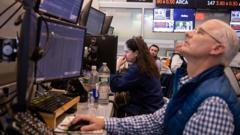In an unexpected turn of events, US President Donald Trump announced he would suspend previously imposed steep tariffs on goods from most countries, opting instead for a more moderate 10% import tax rate. Following this announcement, US stock markets experienced a historic rally, with the S&P 500 surging 9.5%, marking its largest daily increase since the financial crisis in 2008.
The pause comes as a response to feedback from trade partners willing to negotiate, although Trump maintained that tariffs on China would increase to at least 125% "effective immediately." The abrupt shift came less than 24 hours after the implementation of the higher tariffs, which had dramatically affected key trade partners like Vietnam, facing a crippling new 46% levy.
Before this latest announcement, investors faced turmoil; the S&P had plunged by over 10% with analysts warning of looming recession risks both domestically and globally. The bond market reacted negatively, as fears of a sell-off prompted many to dump US government securities. Paul Ashworth, chief North America economist at Capital Economics, noted that Trump's willingness to backtrack on tariffs might mitigate some economic risks, but he foresees challenges ahead in achieving a consensus with China, despite a return to negotiation talks.
The day concluded with the Dow Jones Industrial Average up more than 7.8% and the Nasdaq seeing an exceptional 12% increase. Many companies, particularly in the tech and retail sectors, benefited greatly from the announcement. Nike saw an 11% rise, while Apple surged approximately 15%.
However, despite the market gains, the leading US indices remained below their pre-announcement levels, with the S&P 500 still down about 3%, reflecting year-to-date declines exceeding 8%. Tariffs on Chinese imports, a significant source of American retail goods, continue to pose challenges. In the previous year, China was responsible for over $400 billion in US goods, contributing roughly 60% of footwear and 36% of clothing imports.
In subsequent comments, Trump expressed optimism about reaching a deal with China and mentioned potential tariff exemptions for select companies, shifting his earlier hardline stance. He noted the political pressure he faced in light of the economic concerns that have arisen due to tariff uncertainties, including from influential backers like Tesla's Elon Musk and billionaire Bill Ackman.
Simultaneously, Goldman Sachs issued a forecast warning of a recession due to the tariffs before revising its predictions shortly after Trump's announcement. Mr. Ackman, who previously advocated for a 90-day pause in tariffs, publicly thanked the president for his decision, echoing the sentiment of many market watchers aiming for stability in these turbulent times.




















